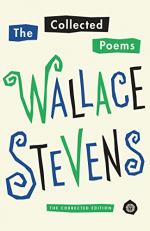|
This section contains 1,063 words (approx. 3 pages at 400 words per page) |

|
Reality and Illusions
This poem is known as one of Stevens’ most ambiguous poems that contemplates the rituals around life and death. The poem uses imagery to describe the speaker’s argument that one must acknowledge reality — including the grim finality of death — to fully experience the sensations of life. The setting of a funeral backdrop, an occasion that can bring on superficial preparations, directly contrasts with how the speaker orders the characters to organize. In the first stanza, the speaker tells the “wenches” (4) to dress “as they are used to wear” (5). The use of the term wenches, whether it entails working-class servants, prostitutes, or simply women, suggests that their clothes would be far from fancy. The speaker instructs the boys to bring “flowers in last month’s newspapers” (6), indicating that no fuss is necessary to spruce up the flowers’ appearance with ribbons or fine wrapping paper...
|
This section contains 1,063 words (approx. 3 pages at 400 words per page) |

|




